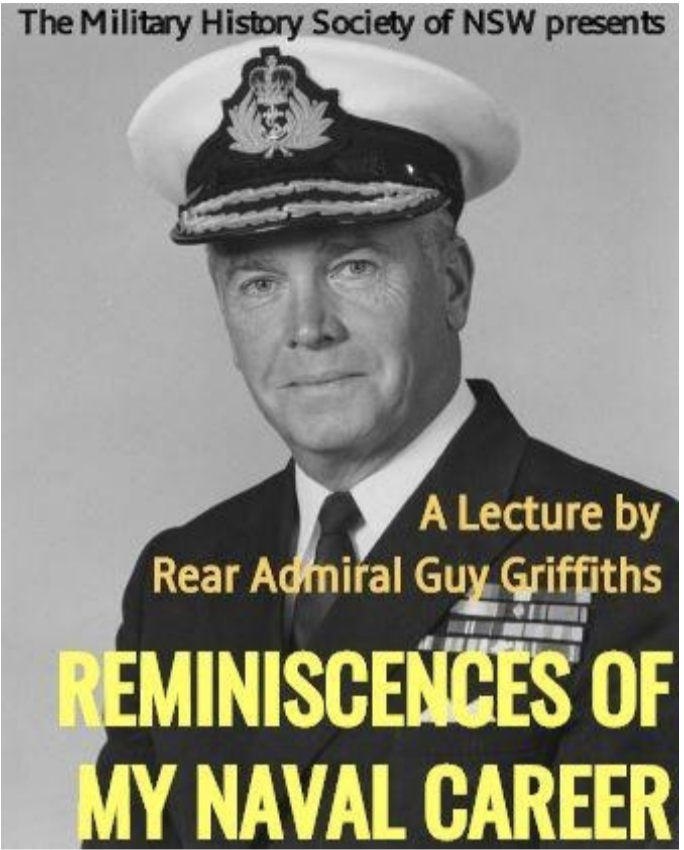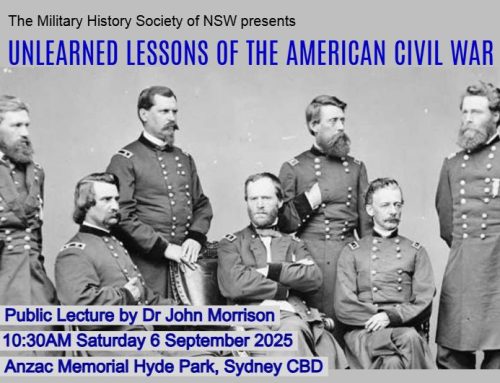The Military History Society of New South Wales Incorporated presents
REMINISCENCES OF MY NAVAL CAREER
A lecture with Rear Admiral Guy Griffiths

Rear Admiral Guy R Griffiths AO DSO DSC RAN (Ret) is one of Australia’s most distinguished military leaders, having served in the Royal Australian Navy – with stints in the Royal Navy – from enlistment as a Cadet Midshipman in 1937, aged 13, to retirement as Rear Admiral in 1980.
During this lecture, Rear Admiral Griffiths will reminisce about his first hand experiences of the terrors and triumphs of naval life. In World War II he was one of the few surviving crew of the battleship HMS Repulse, sunk by the Japanese off Malaya on 10 December 1941, following which he saw action in the culminating battles of the South West Pacific, including Leyte Gulf, Lingayen Gulf and Surigao Strait.
In the post-war era he served aboard the aircraft-carrier HMAS Sydney and the destroyer HMAS Anzac during the Korean War, and as commander of the guided missile destroyer HMAS Hobart in the Vietnam War.
He participated in the evacuation of Darwin after Cyclone Tracey in 1974 as commander of aircraft carrier HMAS Melbourne. Subsequently he served as Chief of Naval Personnel.
The Military History Society of New South Wales is honoured to present this special event. Details of the event’s time and venue appear below.
Saturday 7 March 2020, 2.00pm – 3.00pm
Goulburn Room, Level 4, City of Sydney RSL, 561-567 George Street, Sydney
For further information call 0419 698 783 or email president@militaryhistorynsw.com.au
Although entry is free, a gold coin donation is appreciated.
Biography – Rear Admiral Guy R. Griffiths, AO DSO DSC RAN (Ret)
 Guy Griffiths was born in Sydney on 1 March 1923 and grew up in the Rothbury/Pokolbin district in the Hunter Valley, NSW. He entered the Royal Australian Naval College as a Cadet Midshipman in January 1937; aged 13. He excelled as a sportsman and gained colours for rugby, hockey, rowing and athletics and was made the Chief Cadet Captain of the College in 1939. After graduation from the College in late 1940 he was posted to the Royal Navy for further training. Midshipman Griffiths joined the battle cruiser HMS Repulse in March 1941.
Guy Griffiths was born in Sydney on 1 March 1923 and grew up in the Rothbury/Pokolbin district in the Hunter Valley, NSW. He entered the Royal Australian Naval College as a Cadet Midshipman in January 1937; aged 13. He excelled as a sportsman and gained colours for rugby, hockey, rowing and athletics and was made the Chief Cadet Captain of the College in 1939. After graduation from the College in late 1940 he was posted to the Royal Navy for further training. Midshipman Griffiths joined the battle cruiser HMS Repulse in March 1941.
On 10 December 1941 HMS Repulse was sunk off the east coast of Malaya, by Japanese air attack, while in company with the battleship HMS Prince of Wales. After rescue Midshipman Griffiths was posted to the battleship HMS Revenge. He was promoted to Sub Lieutenant in 1942 and, in early 1943, he served briefly in the destroyer HMS Vivian before joining the cruiser HMAS Shropshire, on commissioning, in May 1943.
During the next two years he saw action in the South West Pacific, including the battles of Leyte Gulf, Lingayen Gulf and Surigao Strait during the fighting to liberate the Philippines. He was promoted to Lieutenant in 1944 and awarded the Distinguished Service Cross in May 1945 ‘For gallantry, skill and devotion to duty whilst serving in HMAS Shropshire in the successful assault operations in the Lingayen Gulf, Luzon Island’.
After the war, he completed the specialist course in gunnery at HMS Excellent (Portsmouth) and then conducted two years exchange service with the Royal Navy at HMS Drake (Devonport) before returning to Australia. From 1950-52 he served as gunnery officer in the aircraft carrier HMAS Sydney and saw service in the Korean War during October 1951-January 1952. Griffiths was promoted to Lieutenant Commander in mid-1952 and posted as the gunnery officer in the destroyer HMAS Anzac; later that year the destroyer operated in the Korean theatre and he saw further active service. Griffiths undertook the Royal Naval Staff Course in 1954 and then served in the aircraft carrier HMAS Melbourne during 1955-56.
Griffiths was promoted to Commander in late 1956 and posted as the Staff Officer Operations and Intelligence on the staff of the Flag Officer Commanding the Australian Fleet. In late 1958 he was posted to Navy Office in Canberra as the Deputy Director Manpower. In 1961, he became the commissioning commanding officer of the destroyer escort HMAS Parramatta. This was followed by duty as the Director of Tactics and Weapons Policy at Navy Office, Canberra. In 1964 he was promoted to Captain and in December 1965 he took command of the guided missile destroyer HMAS Hobart. The ship saw action in Vietnamese waters in 1967 and he was awarded the Distinguished Service Order (DSO) ‘For devotion to duty in the presence of the enemy as Captain of HMAS Hobart’. From late 1967 he served in Malaysia as Naval Adviser to the Chief of Naval Staff, Royal Malaysian Navy and in 1970 attended the Imperial Defence College, London.
In 1971 he was posted as Director-General Operations and Plans at Navy Office, Canberra and was promoted to Commodore in the same year. From late 1973 to mid-1975 he commanded the aircraft carrier Melbourne, which was flagship of the Australian Fleet and in addition to its normal operations the ship participated in Operation NAVY HELP DARWIN after Cyclone Tracy destroyed the city on Christmas Day 1974.
In June 1976 he was promoted to Rear Admiral and appointed Chief of Naval Personnel. In January 1979 he took up his final posting in the Navy as the Flag Officer Naval Support Command. In June 1979 Rear Admiral Griffiths was made an Officer of the Order of Australia (AO) ‘For service to the Royal Australian Navy over a period of 42 years and particularly as Chief of Naval Personnel’. Rear Admiral Griffiths retired from the Navy in January 1980 after 43 years’ service.
Rear Admiral Griffiths was married with one son and one daughter and his interests include golf, skiing, reading and family history research. He was the Personnel Director of Wormald International 1980-83 and also acted as a Defence consultant for three years. Rear Admiral Griffiths was the National President of the Australian Veterans and Defence Services Council 1980-2004, Chief Executive Officer for the North Shore Heart Research Foundation 1987- 1995 and is currently patron of the HMS Prince of Wales and HMS Repulse Survivors Association. In 2010 a new accommodation block at HMAS Creswell was opened and named the Griffiths Block in his honour. Rear Admiral Griffiths is a Fellow of the War History Institute.






